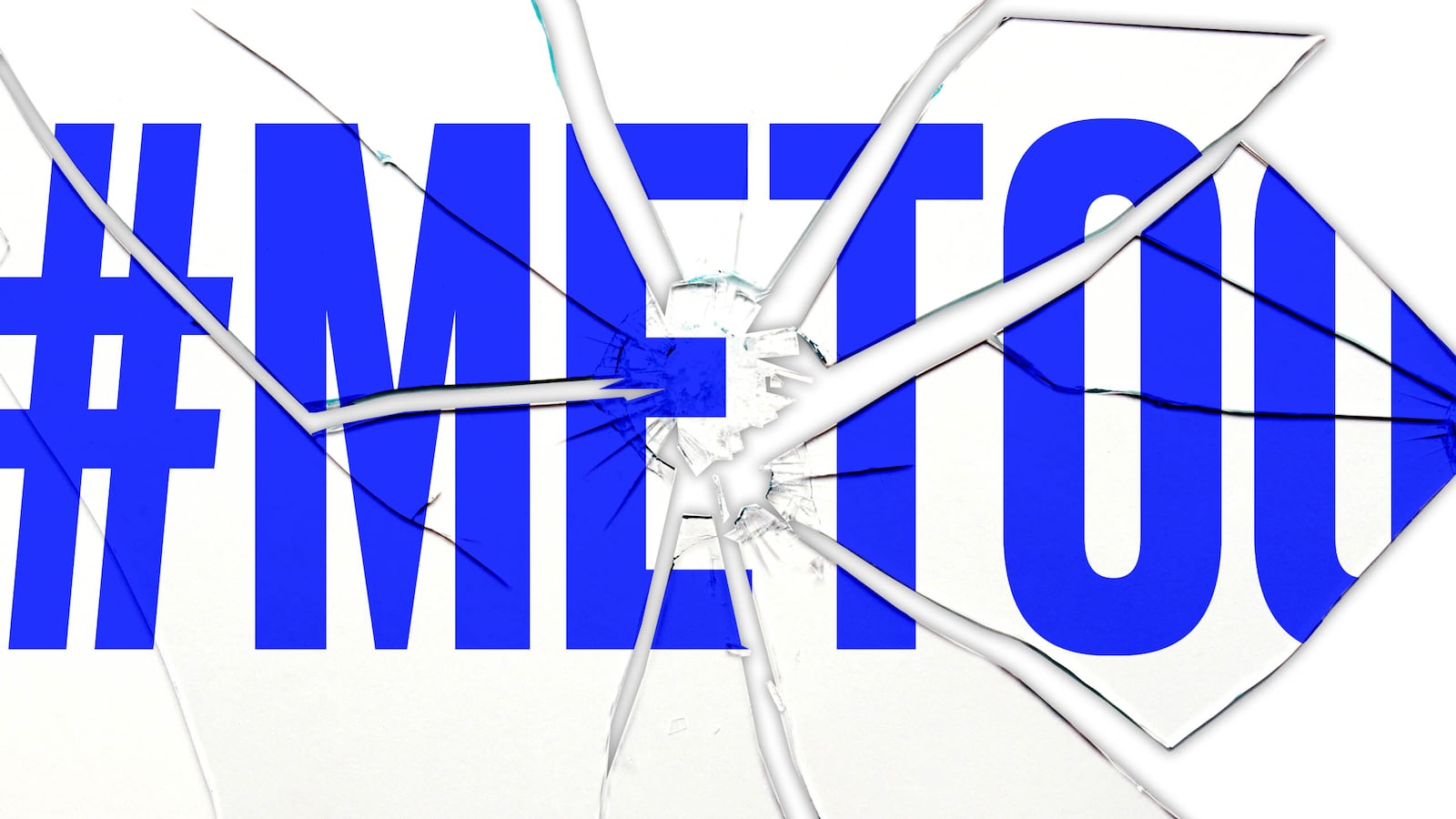A year ago, the first wave of women came forward, outing Harvey Weinstein as their rapist. That’s one place to start. The #MeToo moment or movement is shorthand for the 12 months since Jodi Kantor and Megan Twohey exposed Weinstein in The New York Times, with Ronan Farrow quickly following suit in The New Yorker. But of course it’s not that simple, or contained.
The act of disclosing abuse or naming an abuser is not a new phenomenon; women have historically used numerous methods, including whisper networks, to protect themselves and others. Simultaneously, media outlets have reported on entertainment industry abusers and published allegations of sexual misconduct in the past, albeit in a far more limited capacity. Activist Tarana Burke started “Me Too” back in 2006, “to help survivors of sexual violence, particularly young women of color from low wealth communities, find pathways to healing.” Many journalists over the years tried, and failed, to report the Weinstein story. Actresses tried and failed, or were bullied and dissuaded from trying, to share their personal testimonies.
The difference is (or at least, it was supposed to be) an elevation of these reports, a centering of these stories. The sense that, finally, something would change—that abuse would be taken seriously, and abusers seriously dealt with. Outlets dedicated whole teams to reporting out #MeToo allegations. Big-name journalists chased stories that previously would have been left to the gossip blogs. Was this worthwhile, important journalism? Of course. Has it helped the survivors who risked everything coming forward, or had any tangible effect on the systems that facilitated and protected their abusers? Well, that depends on who you ask, and how closely you listen.
As outlets across the world diverted unprecedented resources and attention to sexual misconduct allegations, templates emerged for these reports. Fail to meet certain journalistic standards, or take a gossipy tone, and you risked readers discounting your story. Then again, disclosing to Babe.net isn’t the only way to be branded a liar. Even in a post-Weinstein world (and really, can anyone be counted out at this point?) there will always be people looking for any excuse not to believe you. There are a million ways to handle your rape wrong.
When I talked with Melissa Schuman, the singer and actress who accused Backstreet Boys member Nick Carter of sexual assault last November, she lamented the hoops that survivors are expected to jump through, the standards their stories have to meet. The incredibly brave act of coming forward immediately triggers a series of escalating questions and demands. You need to go to the police—wait, why didn’t you go to the police then? Are there other women? If there aren’t, well… Oh, so there are other women? Then you have to make them talk, on the record, to a reputable publication. “It’s very upsetting to me that I’ve had multiple [people] tell me, force them to come out and say something!” Schuman told me in August. “Why is my voice not enough? Why isn’t the voice of the underage girl in Marathon, Florida, who went to the police not enough?” she said, referencing a second allegation.
Schuman, by the way, did go to the police. This month, the Los Angeles District Attorney’s office declined to pursue the case against Carter, reportedly because of the passed statute of limitations. Meanwhile, Schuman has been attacked online, threatened and doxed. She described the harassment as “non-stop.”
Survivors of all gender identities come forward across a spectrum of motivations. The most common reason I’ve heard is the desire and compulsion to help others—past and future victims of their abuser whose stories need to be bolstered, need to be corroborated; the people who need to be stopped before they start. Long before reputable news sources began calling them and offering a platform, survivors talked to each other. They built up communities and networks of support. Often when I was reporting a story, it quickly became clear that victims of the same abuser had already found one another—through mutual friends, chance encounters, or social media posts, years before the rest of us started combing through Twitter and Tumblr for overlooked allegations. Singer and songwriter Alice Glass, who accused her former Crystal Castles bandmate Ethan Kath of physical, emotional, and sexual abuse, saw these relationships as a silver lining and a life vest, saying, “I honestly don’t know where I would be without the support of other women who understand what I went through.”
Another alleged victim of Kath’s, Dana Wright, told me that after she read Glass’s initial statement about the abuse, “I never felt like I needed to speak to a person more in my life.”
In recent weeks, men accused of abuse have begun penning woe-is-me essays about their hellish year—“My Year of Being Held Responsible for My Own Behavior,” as the New Yorker’s Jia Tolentino writes. They have done so with no regard for or understanding of the lived experiences of public accusers. First, there are the years or even decades they’ve spent silently dealing with the aftermath of their abuser’s actions—lost job opportunities or whole careers, therapy costs and PTSD, the pain of being held back by something you did not do, and watching the person who did it rise, unchallenged and unrepentant. Then there’s the trauma of coming forward, of telling the story over and over again, of reading your abuser’s response, most likely a denial. The trolling, the harassment—knowing that everyone on the internet has a hot take about your rape, and many of them think it didn’t happen.
In the face of all of this, they survive. They try to fix the hurt and harm that their abusers disavow. In the case of William Control, the musician accused of helming a “sex cult,” alleged victims have banded together to share testimony and resources. They’ve amplified a GoFundMe page for the musician’s wife, who left him after the story broke, as she attempts to pay legal fees and support her son. On September 2, Control returned to Instagram, captioning a shirtless photo, “It’s good to purge the emotional snakes you’ve let into your heart.” The Federal Way Police Department in Washington declined to prosecute him.
As months passed, I found myself recycling words and assumptions that I had begun to lose faith in—endless articles likening #MeToo to a revolution, a radical wave, a reckoning and a reconfiguring. Pieces about men who surely wouldn’t dare attempt to come back from this, and reactions once they inevitably did. At its worst, reporting on this beat has felt opportunistic and performative, like asking an actress about sexual assault and harassment in her chosen industry and hoping for a “good” soundbite. Change should look like more than every A-lister being trained to talk about rape for 50 seconds without getting themselves cancelled (it should be emphasized here that high-profile stories do pave the way for outings in other industries, and that Time’s Up has raised millions of dollars for its legal defense fund).
Yes, I am glad to live in a world where we are talking about these things. But I rarely feel glad, or happy, or safe—not when I’m reporting out these kinds of stories or when I’m reading them, not when I’m watching strangers, colleagues, and loved ones struggle under the weight of all-sexual-assault-all-the-time news feeds. Not that I’ll feel better when the conversation is slowly but surely dominated by the redemption narratives of men who have decided that time is up on Time’s Up.
Less than two years ago, Trump was elected, in spite of numerous allegations of sexual harassment and assault. Last week, Christine Blasey Ford testified before a Senate committee that Brett Kavanaugh, Trump’s Supreme Court nominee, held her down when she was 15, groped her, and attempted to tear off her clothes, covering her mouth while she screamed. I have endless admiration for survivors’ bravery and conviction in coming forward. I just wish we had better choices. And I wish our choices had better consequences.
Keep Reading for more Daily Beast 10th Anniversary Coverage:








